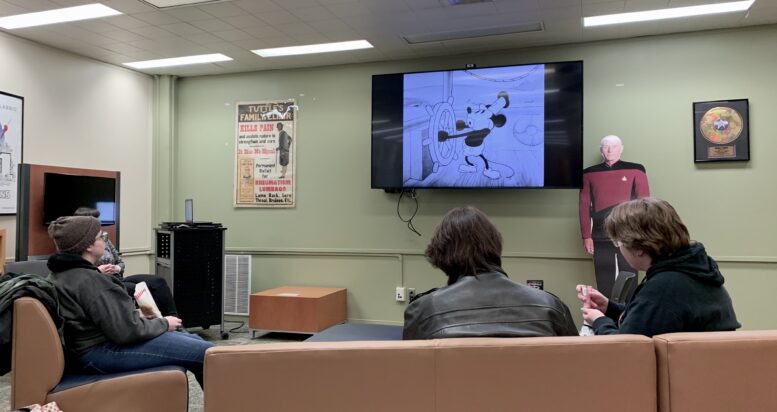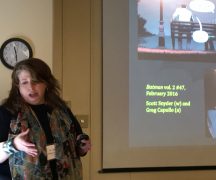By JULIE CARLE
BG Independent News
The Browne Popular Culture Library welcomed Mickey Mouse into the public domain this week by showing the first two animated short films that introduced him to the world.
“Steamboat Willie” and “The Gallopin’ Gaucho,” both released in 1928, featured the first iteration of the world’s favorite mouse and his girlfriend Minnie. The library was able to screen the films for the public because Disney’s copyright officially expired after 95 years, putting them into the public domain.
“Plane Crazy,” a third animated cartoon with Mickey Mouse, did not do as well as the other two, so it was not released until 1929. “It won’t be in the public domain until next year, which is why I am not able to show it,” said Tyne Lowe, manuscripts archivist for the popular culture library at Bowling Green State University.
The caveat, however, is that the Mickey and Minnie from the 1928 films are the only ones that are in the public domain and available to be used in any creative projects, Lowe explained.
“This Mickey is unique from many later ones. It’s pretty specific. In ‘Steamboat Willie,’ Mickey does not wear gloves, but he does wear gloves in most later versions, which means any version of Mickey with gloves is still in copyright,” she said.
Public domain is when no one holds a copyright for a creative work, such as writing, music, artwork and film. Anyone can use the work, in part or in whole, in new creative works or products without having to obtain rights or without facing possible legal action from the copyright holder.
Each year on Jan. 1, new creative works are added to the public domain because their copyrights have expired. In addition to “Steamboat Willie” and “Gallopin’ Gaucho,” new to the public domain in 2024 are original character iterations of Tigger by A. A. Milne and J. M. Barrie’s Peter Pan.
Films and literature that entered the public domain included Charlie Chaplin’s “The Circus,” Harold Lloyd’s “Speedy,” The Hardy Boys’ “The Missing Chums” and “Lady Chatterley’s Lover” by D.H. Lawrence. Notable songs now in the public domain include “I Can’t Give You Anything but Love, Baby,” “Makin’ Whoopee,” and “You’re the Cream in My Coffee.”
Copyright law and public domain are very complex, Lowe said. There are many exceptions, and the laws vary by media and country of origin.
According to Emily Gattozzi, scholarly communications strategist at BGSU’s William T. Jerome Library, there are many reasons creative works are included in the public domain. In addition to a copyright expiring, creative work may be in the public domain because the work is not copyrightable, they don’t meet copyright eligibility requirements, or the creator dedicated their work to the public domain, foregoing their copyright.
The U.S. Constitution’s copyright laws granted Congress the power to promote the progress of science and musical arts by establishing copyright protection, Gattozzi said. Congress revised the copyright act in 1976 and again in 1998.
“It feels like it takes forever for something to enter the public domain. As a general rule, U.S. copyright protection for works created after Jan. 1, 1978, last the life of the author plus 70 years,” she said.
“If no one holds exclusive copyright to works in the public domain, we are all free to copy and distribute them, display and perform them, and to make derivatives,” she added.
Referencing the International Federation of Libraries Associations and Institutions, Gattozzi said, “The public domain is important because it is part of the common cultural and intellectual heritage of humanity and is the source of inspiration, imagination and discovery for creators.”
In addition to the Mickey Mouse short films, “Metropolis,” a groundbreaking science fiction film of 1927, was screened on Tuesday as part of the popular culture library’s first Public Domain Film Festival.
Five films were featured this week, with “His Girl Friday” with Cary Grant and Rosalind Russell, the last for this week, to be screened today (Jan. 19) from 2-4 p.m. The comedy, thought to be “the original screwball comedy,” was created in 1940; it entered the public domain when no one renewed the copyright in 1969 after its original 28 years of copyright protection.
Next week’s public domain films from the library’s collections include:
- A double feature of “Reefer Madness” (1936) and “Teenagers from Outer Space” (1959) on Monday, Jan. 22 from 5-8 p.m.
- “Night of the Living Dead” (1968) on Tuesday, Jan. 23 from 6 to 8 p.m.
- “The General” (1926) on Thursday, Jan. 25 from 3-4:30 p.m.
- Superman cartoons (1941-1943) on Friday, Jan. 26 from 3-4:30 p.m.
“We wanted to feature some of the new works in the public domain and also highlight some of the other public domain items that are available at the pop culture library,” Lowe said about hosting its first Public Domain Film Festival.





